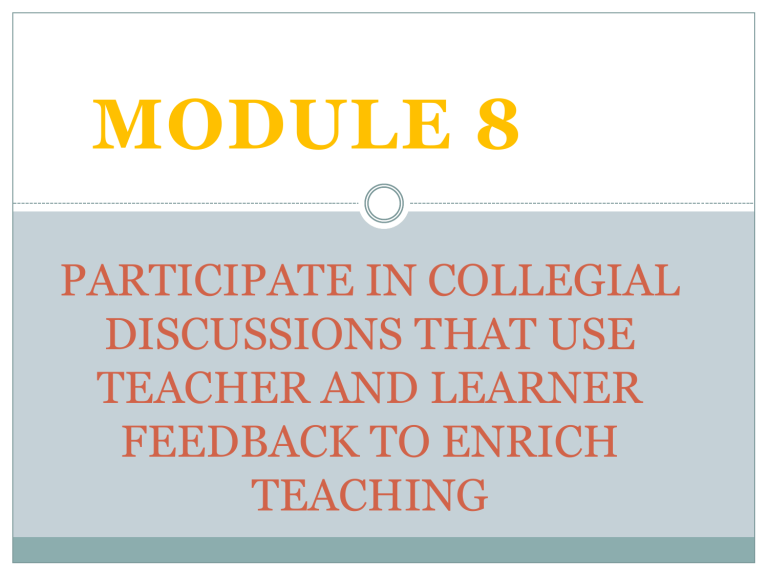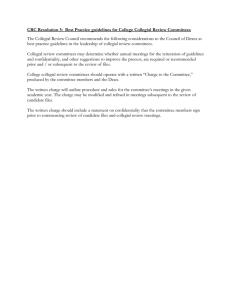
MODULE 8 PARTICIPATE IN COLLEGIAL DISCUSSIONS THAT USE TEACHER AND LEARNER FEEDBACK TO ENRICH TEACHING In this module, we will focus on: STRAND: Professional collaboration to enrich teaching practice INDICATOR: 4.4.2 Participate in collegial discussions that use teacher and learner feedback to enrich teaching practice. “ KEY CONCEPTS “ PROFESSIONAL COLLABORATION. This refers to teachers working together with colleagues and other stakeholders to enrich the teaching learning process. COLLEGIAL DISCUSSION. This refers to mutually respectful professional conversation with colleague/s, which can be formal or informal, that promotes shared responsibility in enhancing the current practice. FEEDBACK. This refers to information given about the teacher’s and learners’ performance for enriched teaching practice. MASTER TEACHER: We have received the summary of classroom observations from the office and findings have identified that our pupils do not participate that much in the class. Any reaction? TEACHER A: I think that’s not the case in my classroom. MASTER TEACHER: Really? I assume that it might have been observed in your class. When I came to pass by your room one time, I noticed that your learners at the back were just playing. How about you, Ma’am? TEACHER B: I think we need to figure out the reasons why such observations were noted. MASTER TEACHER: Obviously, your activities might be too dull and boring. You should have prepared exciting tasks for your learners. You should have established rules. You should have performed better during class observations. I think if you do these things, then you’ll engage your learners. Does everybody agree with me? TEACHERS: Yes, Ma’am. Based on the FGD presented earlier, try to answer and reflect on the following questions. What specific challenge to the teaching practice was discussed in the focus group discussion? Did the Master Teacher engage the teachers to address the challenge? Why? Why not? If you were the Master Teacher, what questions would you have asked to draw feedback from your colleagues? Did the discussion reflect teacher collegiality? Why? Why not? What roles do teachers play in collegial discussions? Suggestions for Improvement Collegial discussion is built on mutual respect and trust. For it to become a meaningful professional conversation, the teachers should be actively listening and providing honest feedback. These will provide a common ground for collaboratively reflecting and directing efforts to the enhancement of the teaching practice. ILLUSTRATIONS OF PRACTICE ILLUSTRATION OF PRACTICE NO. 1: COLLEGIAL DISCUSSION BETWEEN PEERS In a school, a 2nd grade teacher finds teaching reading challenging. She knows that her colleague has a broad knowledge of different reading strategies. She talks to her and requests for a peer observation. On the agreed date, the peer teacher models the reading technique that she finds effective for her class. After, they engage in a discussion clarifying how the new teacher can apply the technique to her own class. You have noted that peer observation involves teachers observing each other’s practice and learning from each other. Here, teachers have the opportunity to give and receive feedback about teaching practice and develop awareness about their own teaching. Remember that peer observation is generally a friendly classroom observation. It should NOT be a surprise classroom observation. This should be well-communicated. To do this, you may engage in a pre-conference with your colleague to identify your role, as well as the specific areas in the instructional practice for the focus of peer observation. ILLUSTRATION OF PRACTICE NO. 2: PROFESSIONAL LEARNING COMMUNITIES (PLC’S) In an elementary school, the teachers, with the Master Teacher as the LAC leader, conduct schoolbased professional learning sessions that focus on the different instructional approaches for K to 12. Teacher-experts lead the discussion and the demonstration teaching. The LAC leader then evaluates the teachers’ application of learnings from the LAC through classroom observation. Remember, that professional learning communities like LAC sessions can be maximized to improve learner performance, with teachers discussing a range of topics to support teaching and learning. They are also vital in addressing their professional development needs, sharing challenges in teaching, strategies and best practices, and even sharing new skills and knowledge learned in other trainings. Remember, LAC is NOT just a meeting. It is a purposeful professional learning activity for us teachers which focuses on addressing critical areas in instruction that need improvement. ILLUSTRATION OF PRACTICE NO. 3: COACHING SESSION Based on this practice, instructional coaching can become a meaningful and powerful tool to engage teachers in professional learning. It comprises a collaborative partnership supporting teachers’ goal-setting, using research-informed teaching practices. The coach focuses on supporting the professional growth of individual teachers through modelling practice, classroom observation and reflection, joint problemsolving, and conversations about teaching practice (AITSL, n.d.) HOW TO DO IT? You’ll definitely get the most from every instructional coaching session if you: 1. Provide honest evaluation of your personal teaching practices. 2. Seek and be open to suggestions. 3. Reflect on your practices, build on them and modify them if necessary. ILLUSTRATION OF PRACTICE NO. 4: LEARNING WALK The teachers participate in a classroom visit to learn from the classroom management styles of the host-teacher. Prior to the visit, they communicate the idea to the host-teacher who positively agrees and prepares for it. On the scheduled date, the teacher-walkers visit her classroom while she teaches. They are able to collect evidence of her effective techniques. After the visit, they engage in a professional dialogue that highlights sharing of the host-teacher’s effective practices like pair work and differentiating learning activities. You might have developed the stigma of threatening unplanned visits in the classroom, but a learning walk is different. It is NOT a surprise classroom visit. It should be well communicated. The observer-walkers and the host-teachers should identify and agree on a common area for discussion. It should also be non-disruptive and non-invasive to the host classroom activities. It is not evaluative nor is it designed for individual feedback (Williamson and Blackburn, 2013). Collegial discussions are generally built on feedback, whether they are about teacher performance or learner performance. Feedback should be timely and specific and can take many forms. Informal verbal feedback is usually unplanned and brief. An observer might stop by a teacher’s classroom after class to give positive comment about an observation earlier in the day. It can also be written such as an email. On the other hand, formal verbal feedback is more extensive and is usually given during structured sessions. When written, they are detailed and specific about what the teacher/learner did that was not effective or which needed to be adjusted (Marzano, Simms, Roy, Heflebower, & Warrick, 2012). For your participation in collegial discussions, you need to develop trust and respect for your colleagues because they can provide you with significant feedback which you can utilize to enrich your teaching practices. Likewise, your commitment to apply whatever learnings you have gained from these professional collaborations will contribute immensely to the enrichment of your teaching practices


